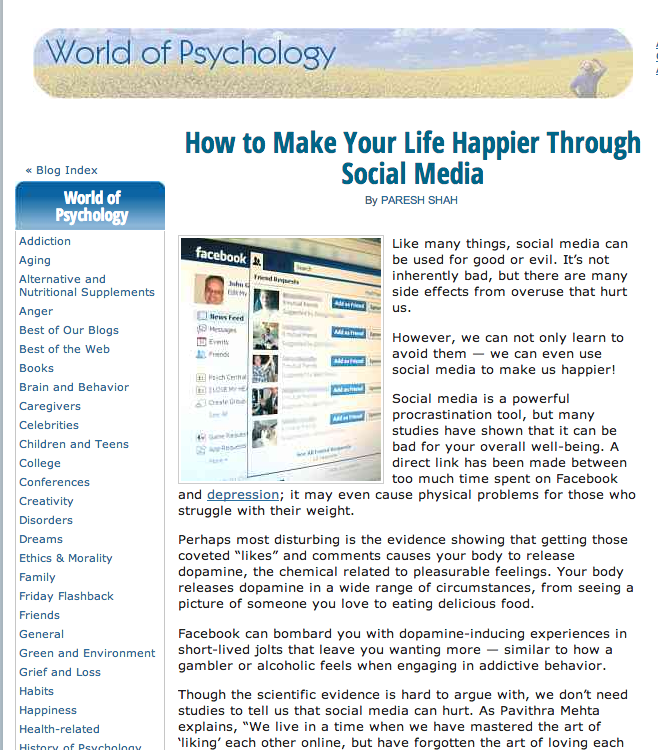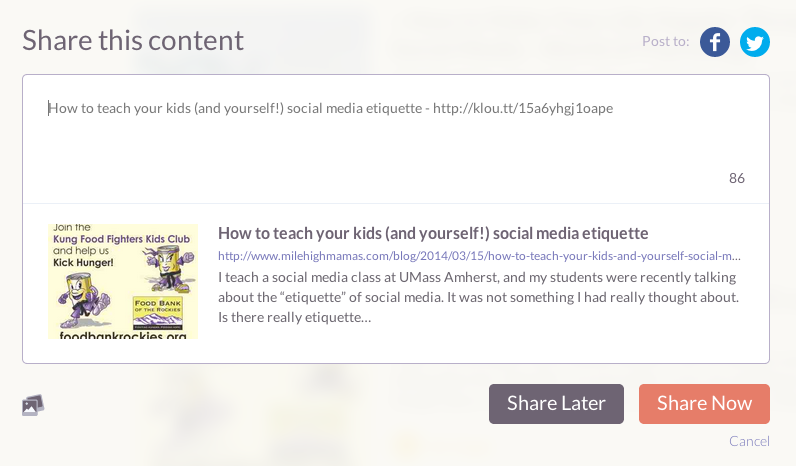Last month, social scoring platform Klout shared news: it was adding important new features to its tool.
No longer was Klout just going to be a social scoring platform designed to help manage “influence.” Now, it claims, it will help you BUILD your influence by helping you discover new content it believes your followers want and need.
Now, that sounds good on the surface, but don’t we have tools that do this already–and conceivably better than Klout can?
After all, we already have tools like Feedly (my favorite), Flipboard and Zite, just to name a few.
But since Klout insisted it could deliver in this area, I thought I’d give it a little deeper look. Here’s what I found:
Klout’s content consumption “formula” sucks
That’s a bit blunt, I know. But really, Klout fails to deliver here big time. In a recent post, Klout had this to say about how it was different from other apps that deliver content:
“Other apps and news readers that surface content are solely intended for your personal consumption. Klout, on the other hand, intelligently recommends content that will strike a chord with your unique audience on social. We can do this because we understand both the topical interests and the cross-network behavior of your audience.”
But, when I visited Klout to “discover” new content under the “PR” category recently, here’s what I found:
* 3 articles from PR Daily
* 2 articles from Spin Sucks
* 1 article from PR Examples
* 1 article from something called “JohnnyJet.com”
* 1 Medium post
* And 1 article from TheSource.com
Anyone who’s anyone in the PR field probably already reads PR Daily on a regular basis. And Spin Sucks (Gini Dietrich’s blog) is one of the most popular PR blogs on the Web. So, I’d say a lot of people already read those sites.
And the other posts Klout uncovered were either off-base or irrelevant. The article from JohnnyJet was an interview with a PR travel pro (off-base). And the article TheSource.com delivered was about an ad the lost Malaysian airlines ran a few years ago that is now a bit uncomfortable.
Bottom line, of all the articles Klout uncovered for me, none were what I would consider nuggets of information people who “follow” me would be interested in.
I think Klout is lying
Here’s what Klout has to say about where it finds the content surfaced in your stream:
“Klout pulls content from both social media (e.g. what’s being shared on Twitter and Facebook) as well as a hand-curated list of thousands of RSS feeds from diverse publishers. All content is discovered organically without any paid relationship. If, in the future, Klout were to post content sponsored by a 3rd party, we would mark it accordingly.”
OK, note the language: “hand-curated list of thousands of RSS feeds from diverse publishers.” We just talked about what popped up in my feed under “PR”–3 PR Daily articles and 2 posts from Spin Sucks. That from a complete list of 10 posts (at the time I checked, at least, yesterday). So, out of 10, 5 were from PRD and Spin Sucks. Doesn’t sound very “diverse” does it?
Let’s take a look at another category I follow: Social media.
* 2 more articles from PR Daily
* 2 articles from Social Media Examiner.
* 2 articles from something called PsychCentral.com
So again, six of the 10 articles were from three sites–two of which are wildly popular in the social media world and one that’s a psychology-based site. Is Klout really pulling from “thousands” of RSS feeds, or are they pulling from some of the most popular PR/social media sites on the web (what’s next, Social Media Today articles?) and wildly irrelevant sites (again, I almost expect to see a Buzzfeed article in my feed).
The human brain > Klout
I’m sure this will come as a surprise to no one, but your brain is MUCH better at discovering new content on the web than Klout. Want proof? Let’s look at the social media category again. Again, TWO article out of 10 were from a psychology-based site. But, isn’t psychology a big part of social media, Arik? Sure, I’ll grant you that. But, if you look deeper at the article titled “How to make your life happier through social media” you can see it’s more about how social impacts your mood and well-being than it is about social media and the marketing world.
I would guess most of the people who follow me online are most likely interested in PR/social media/marketing approaches from a business perspective. After all, that’s what we do for a living. Very rarely do I share article like this. But, Klout thinks it’s relevant. Why? Maybe because social media’s in the title or body copy. I don’t know. And frankly, I don’t care. What I do know is this is not an article I would share with people who I would consider worthy colleagues. And I know for a fact they would not find it interesting or click on it.
So, how smart is Klout really? Not very. The lesson (and it’s not a new one): Your brain is much smarter than Klout. Continue to exercise it.
Don’t we already have a social sharing tool we like and use?
For most of us, the answer to this question is yes. Whether it’s Buffer, Hootsuite or Tweetdeck, most of us have a social sharing tool we use religiously at this point. And, it’s awfully hard to break a habit. Especially when that habit is working.
So, why would anyone switch to Klout? I’m not sure I can answer that for you, but for me the answer is “I wouldn’t.” The tool is just too basic and doesn’t seem to offer anything I can’t get anywhere else.
So, that’s my two cents on Klout’s new content discovery and sharing tool. Have you tried out the new Klout tools yet? If yes, what do you think?






0 Comments